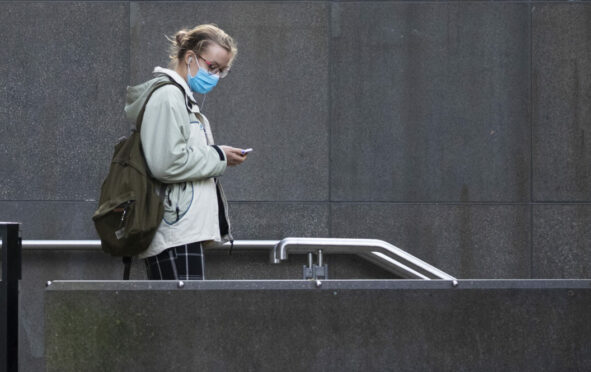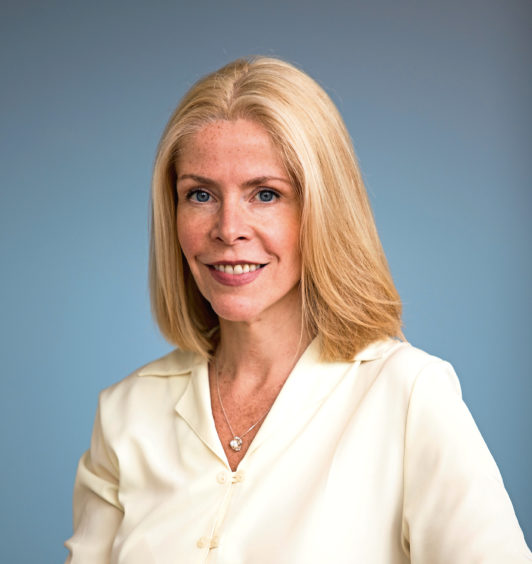
Scots could be advised to work from home and, if that is not possible, wear a mask all day at their workplace, according to a government adviser.
Professor Linda Bauld was speaking before the first minister is expected to announce a widening of Covid restrictions on Tuesday.
The public health expert, based at Edinburgh University and a pandemic adviser to ministers, said case numbers in Scotland remained too high and a recent rise prompted ministers to look at strengthening restrictions.
She said capacity issues in the NHS left ministers with little choice but to look at tighter rules. However, she believes it is unlikely Scotland will follow some countries in mainland Europe in preparing for new lockdowns.
Bauld said: “At the moment if we can distance in the office we don’t have to wear a face covering. They could change that. That would not be unreasonable.”
She added: “There are choices the government has. The first thing you do is focus on vaccinations, as this government is doing. Step two is discussing what else you can do to reduce interactions between individuals.
“The solutions are to look at environments where people are interacting and make changes that either increase vaccine uptake or make those environments safer. That’s why you extend vaccine certification. There is also consideration of adding testing to that.”
She added: “We have plateaued at a high level, and that has been the case since the start of October. Then, at the beginning of November, there were definite signs of a slow increase, which caused real concern.
“Over the last few days it looks like things are improving. There seems to have been an encouraging drop in the number of people in hospital with Covid. That wasn’t the case a week ago when there were still over 900. However, some hospitals are already at capacity and way above what the World Health Organisation regards as a safe level of capacity of about 80%.”
Nicola Sturgeon is expected to encourage Scots to work from home if at all possible and consider the extension of the vaccine passport scheme, currently enforced at venues including nightclubs. There have also been discussions around adding proof of a negative Covid test to entry requirements.
Clubs currently require customers to show proof of double vaccination but this could be extended to pubs, gyms and cafes in an announcement expected from the first minister on Tuesday. It is thought other restrictions may include wearing masks in all workplaces at all times if you cannot work from home.
There could be an estimated 2,000 people in hospital with Covid by the end of the month, according to the Scottish Government’s latest epidemic modelling report. Under this worst-case scenario there would be an estimated 17,000 daily infections.
The best-case scenario, according to the report, is for the number of infections to fall to 2,000 per day and 500 in hospital by December 1.
Deputy First Minister John Swinney told parliament last week the vaccination passport scheme may be extended to cover additional indoor settings such as cinemas, pubs, restaurants and cafes.
This promoted a backlash from the hospitality sector with the Federation for Small Businesses carrying out a snapshot survey of 500 members which shows 78% are opposed and just 11% are supportive.
Swinney also told MSPs the government was considering how to increase the number of people who work from home and strengthening the rules on face coverings.
Bauld said: “The Sage (Scientific Advisory Group for Emergencies) papers point to a single measure that would make the biggest difference short of shutting everything and it would be getting more people to work from home. There is good evidence behind that.”
Professor of social psychology Stephen Reicher, who sits on a Sage sub-group that advises both UK and Scottish Governments on human behaviours, warned against complacency.
He said: “The danger is people think it’s all over. I think people do have a sense that we are near the end. Globally, that is just not true. We’ve seen time and again that it’s cyclical.
“We’ve had periods where one part of the world is doing well and others are doing badly then that changes. So, complacency is the biggest concern. We’re not out of the woods yet.”

Enjoy the convenience of having The Sunday Post delivered as a digital ePaper straight to your smartphone, tablet or computer.
Subscribe for only £5.49 a month and enjoy all the benefits of the printed paper as a digital replica.
Subscribe © Picasa
© Picasa